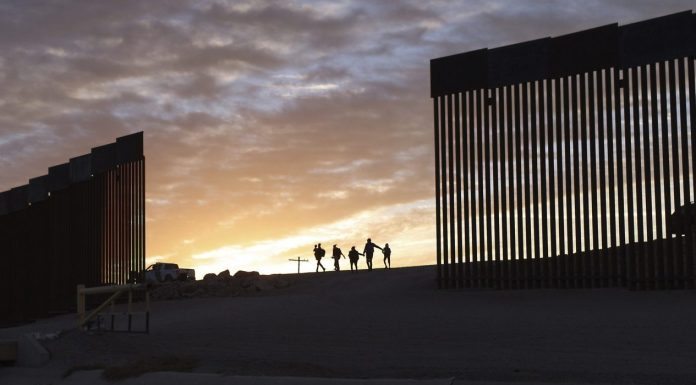(The Center Square, Bethany Blankley) – The National Sheriff’s Association and the Arizona Sheriff’s Association oppose the Biden administration’s nomination of Tucson Police Chief Chris Magnus to be the next commissioner of U.S. Customs and Border Protection.
Both associations sent letters to President Joe Biden expressing their opposition and have asked their U.S. senators to vote against his nomination.
Currently, Troy Miller is serving as the Acting Commissioner for CBP, an agency with more than 60,000 employees and a budget of over $15 billion. Of the 60,000 employees, roughly 45,000 are sworn CBP agents assigned to 328 ports of entry or the borders.
Magnus’ nomination is being championed by U.S. Department of Homeland Security Secretary Alejandro Mayorkas, who has had articles of impeachment filed against him by U.S. Rep. Andy Biggs, R-Arizona, for the ongoing border crisis and dramatic rise in illegal immigration.
At a U.S. Senate Finance Committee Hearing on Tuesday, Democratic Arizona Sens. Mark Kelly and Kyrsten Sinema both endorsed Magnus, with Sinema describing him as an “exceptional nominee to be head of CBP” from her hometown of Tucson.
In a letter to Biden, Cochise County Sheriff Mark Dannels, president of the Arizona Sheriff’s Association, said that sheriffs from a border state who “understand firsthand the crisis that currently exists on the border,” cannot support Magnus as the next head of the agency tasked with protecting it because he simply doesn’t have the experience and hasn’t assisted Border Patrol agents when they needed it.
Magnus “often bypassed working with federal immigration authorities” while police chief, Dannels added, which “caused a rift with the Border Patrol union – many of the same men and women who will potentially be under his command should he be confirmed.”
Brandon Judd, president of the National Border Patrol Council, said that Magnus’ history of refusing to work with the Border Patrol agents he would be overseeing should be disqualification alone, according to public statements he’s made.
Magnus’ issues with CBP agents goes back to 2017 when he declined to help set up a command post to track down a migrant who allegedly escaped from a hospital while protesters were gathered outside.
Also in 2017, Magnus publicly criticized Trump administration immigration policies in an op-ed for The New York Times. He said he was “deeply troubled by the Trump administration’s campaign against ‘sanctuary cities,’ which refuse to turn over undocumented immigrants to federal authorities. Washington is trying to retaliate against them by withholding funding for things like crime prevention, drug treatment and mental health programs.”
In 2019, he expressed support for amnesty, tweeting, “Imagine what it’d be like if you were brought here as a child, grew up here, pay taxes here, only know here – yet have no path to citizenship,” referring to those who received DACA status through an executive order in 2012.
Magnus also rejected Operation Stonegarden federal grants that would have helped fund local government border security efforts, Dannels notes. The money covers overtime expenses and equipment purchases, and has successfully helped local law enforcement remove illegal guns and drugs off the streets.
Dannels has been battling illegal immigration and the cartels for years in a county that shares 83 miles of the border with Mexico. The association he heads represents 14 of the state’s 15 elected sheriffs. He also chairs the border security committee for the National Sheriff’s Association, which opposed Magnus’ nomination in a letter sent to Biden, Mayorkas, and all 100 U.S. senators.
Magnus, who has worked in public safety since 1979, is responsible for roughly 1,200 employees in Tucson, a city with a population of less than one million.
The Tucson sector of CBP is one of the busiest in the country with nine stations in three corridors. It spans 262 miles along the Mexican border from the Yuma County line to the Arizona/New Mexico state line.
In his testimony to the U.S. Senate Finance Committee on Tuesday, Magnus pledged his commitment to ensuring the facilitating of trade, opposing forced labor, and as the head of CBP said he would uphold the law. He said he “would expect without exception that all agency personnel be conscientious, fair, and humane when enforcing the law.”
Magnus described himself as “a pragmatic and bipartisan problem-solver,” and the principles that have guided his career are integrity, accountability, caring and resolve. He cares about “innovative ideas, not ideology.”
In 2014, as Richmond Police Chief, Magnus garnered national attention for holding a Black Lives Matter sign during protests against the police.
The White House said in a news release that Magnus “developed a reputation as a progressive police leader who focused on relationship-building between the police and community, implementing evidence-based best practices, promoting reform, and insisting on police accountability.”
Prior to heading the Tucson Police Department, he was the police chief of Richmond, Calif., and Fargo, North Dakota, and worked with the Lansing Police Department in Michigan for 15 years.

